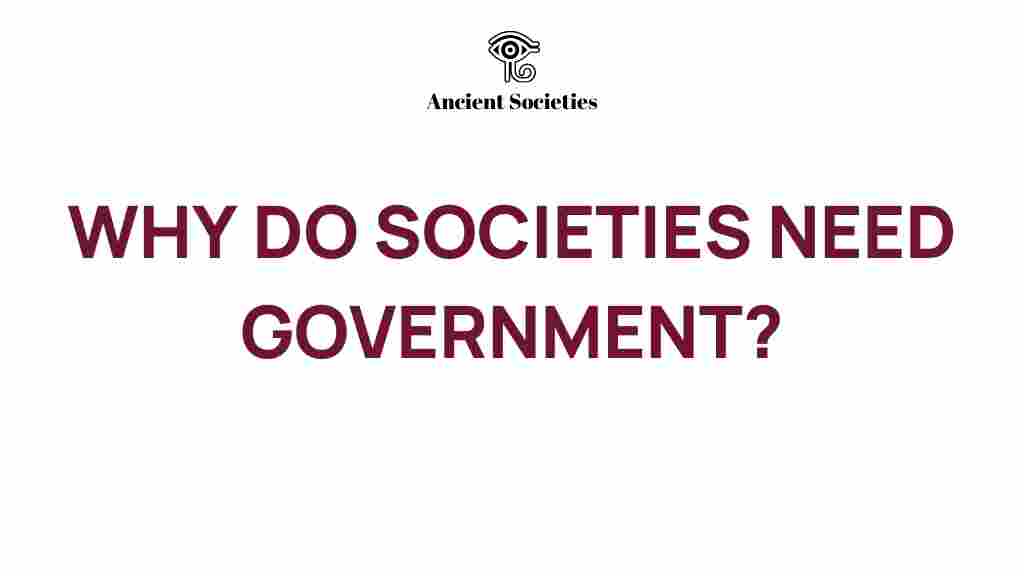The Essential Role of Government: Why Societies Can’t Thrive Without It
The concept of government is fundamental to the structure and function of any society. From ancient civilizations to modern democracies, the role of governance has been pivotal in ensuring stability, order, and the well-being of citizens. In this article, we will explore why societies cannot thrive without government, examining the various aspects of governance and its critical importance in maintaining democracy and authority.
Understanding the Social Contract
The social contract is a philosophical concept that illustrates the implicit agreement among individuals to form a society. In essence, people agree to relinquish some of their freedoms and submit to the authority of a governing body in exchange for protection and the benefits of organized society. This mutual agreement forms the foundation of governance, which ensures that:
- **Rights are protected**
- **Order is maintained**
- **Public services are provided**
- **Disputes are resolved**
Without this social contract, societies would likely descend into chaos, with individual interests overriding collective needs. Here, we examine the essential functions of government in society.
1. Providing Stability and Order
One of the primary roles of government is to provide stability and order within society. This involves creating and enforcing laws that regulate behavior and protect citizens. A stable society is characterized by:
- **Predictable legal frameworks**
- **Effective law enforcement**
- **Conflict resolution mechanisms**
When a government effectively maintains order, it fosters an environment where individuals can pursue their interests without fear of violence or chaos. This stability is essential for economic growth and social development.
2. Upholding Democracy and Governance
Democracy is a form of governance that emphasizes the role of the people in decision-making processes. A functional democracy relies on the establishment of institutions that reflect the will of the populace. Key elements include:
- **Free and fair elections**
- **Protection of human rights**
- **Accountability and transparency**
Through democratic governance, citizens gain a voice in how they are governed, fostering a sense of ownership and responsibility towards their society. This participation is vital in ensuring that government authority aligns with the needs and desires of its citizens.
3. Facilitating Economic Prosperity
Governments play a crucial role in creating the conditions for economic prosperity. This can be achieved through:
- **Establishing property rights**
- **Creating infrastructure**
- **Regulating markets**
- **Providing social services**
By ensuring that individuals and businesses can operate within a stable environment, governments encourage investment and innovation. Economic growth, in turn, leads to improved living standards and opportunities within society.
4. Ensuring Social Justice and Equality
Another essential role of government is to promote social justice and equality. This involves creating policies that address disparities and protect marginalized groups. Key initiatives may include:
- **Affirmative action programs**
- **Public welfare systems**
- **Access to education and healthcare**
By addressing inequities, governments can foster social cohesion and ensure that all citizens have the opportunity to thrive, which is essential for a harmonious society.
5. Promoting National Security
Governments are responsible for protecting their citizens from external threats. This includes:
- **Maintaining armed forces**
- **Intelligence services**
- **Diplomatic relations**
National security is vital for maintaining order and stability within society. Without it, the very fabric of a nation can be threatened, leading to unrest and fear among citizens.
6. Environmental Protection and Sustainability
In recent years, the role of government in protecting the environment has become increasingly important. Governments are tasked with:
- **Regulating pollution**
- **Conserving natural resources**
- **Promoting sustainable practices**
By implementing environmental policies, governments can ensure that future generations inherit a healthy planet, which is essential for the survival and prosperity of society.
7. Facilitating International Relations
Governments also play a critical role in managing international relations. This involves:
- **Negotiating treaties**
- **Participating in global organizations**
- **Promoting trade agreements**
Effective governance at the international level can lead to cooperation and peace, which are essential for global stability and development.
Troubleshooting Common Governance Issues
While governments are essential for societal functioning, they can also face challenges. Here are some common issues and potential solutions:
1. Corruption
Corruption undermines government authority and erodes public trust. To combat this:
- **Implement stricter regulations on campaign financing**
- **Enhance transparency in government operations**
- **Establish independent oversight bodies**
2. Political Polarization
In many societies, political polarization can hinder effective governance. Solutions include:
- **Encouraging dialogue between opposing parties**
- **Promoting civic education**
- **Facilitating bipartisan initiatives**
3. Inequality
Economic and social inequalities can lead to unrest. Governments can address this by:
- **Implementing progressive taxation**
- **Providing access to quality education and healthcare**
- **Enhancing social safety nets**
4. Public Disengagement
When citizens feel disconnected from their government, democratic processes can suffer. To encourage engagement:
- **Promote transparency in decision-making**
- **Utilize technology to facilitate communication**
- **Support community-building initiatives**
5. Environmental Degradation
As environmental issues escalate, governments must respond by:
- **Implementing strict environmental regulations**
- **Investing in renewable energy**
- **Encouraging sustainable practices among businesses and citizens**
Conclusion
The role of government in society is indispensable. From providing stability and order to promoting economic prosperity and social justice, governance is the backbone of a thriving community. The social contract underscores the mutual responsibilities between the state and its citizens, highlighting that a strong and effective government is essential for a successful society.
As we navigate the complexities of modern life, it is crucial to recognize the importance of governance in maintaining democracy and authority. Without a functioning government, societies risk descending into chaos, undermining the very foundations upon which they are built. Therefore, fostering good governance is essential for ensuring a prosperous and harmonious future.
For more insights on governance and its impact on society, check out this comprehensive resource. Additionally, if you’re interested in exploring political systems and their effectiveness, visit this external link.
This article is in the category Society and created by AncientSocieties Team
